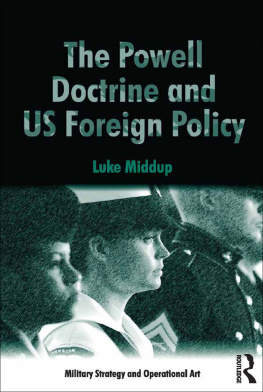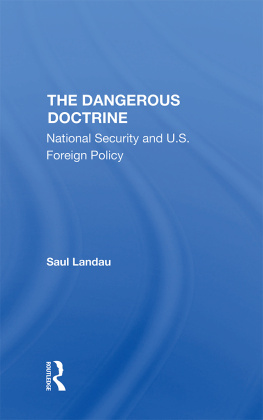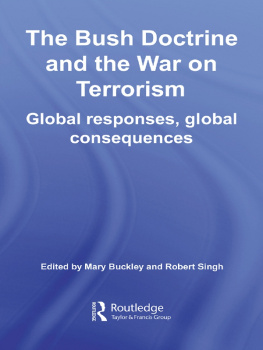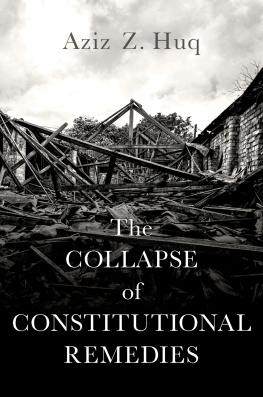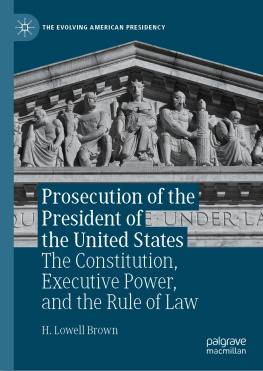THE OXFORD INTERNATIONAL LAW LIBRARY
The Law of State Immunity
Third Edition
THE OXFORD INTERNATIONAL LAW LIBRARY
General editor: SIR FRANK BERMAN KCMG QC
This series features works on substantial topics in international law which provide authoritative statements of the chosen areas. Taken together they map out the whole of international law in a set of scholarly reference works and treatises intended to be of use to scholars, practitioners, and students.
The Law of State Immunity
Third Edition
HAZEL FOX CMG QC
PHILIPPA WEBB


Great Clarendon Street, Oxford, OX2 6DP,
United Kingdom
Oxford University Press is a department of the University of Oxford.
It furthers the Universitys objective of excellence in research, scholarship,
and education by publishing worldwide. Oxford is a registered trade mark of
Oxford University Press in the UK and in certain other countries
Hazel Fox CMG QC and Philippa Webb 2013
The moral rights of the authors have been asserted
First Edition published in 2008
Third Edition published in 2013
Impression: 1
All rights reserved. No part of this publication may be reproduced, stored in a retrieval system, or transmitted, in any form or by any means, without the prior permission in writing of Oxford University Press, or as expressly permitted by law, by licence or under terms agreed with the appropriate reprographics rights organization. Enquiries concerning reproduction outside the scope of the above should be sent to the Rights Department, Oxford University Press, at the address above
You must not circulate this work in any other form
and you must impose this same condition on any acquirer
Crown copyright material is reproduced under Class Licence
Number C01P0000148 with the permission of OPSI
and the Queens Printer for Scotland
Published in the United States of America by Oxford University Press
198 Madison Avenue, New York, NY 10016, United States of America
British Library Cataloguing in Publication Data
Data available
Library of Congress Control Number: 2013943483
ISBN 9780199647064
Printed and bound in Great Britain by
CPI Group (UK) Ltd, Croydon, CR0 4YY
Links to third party websites are provided by Oxford in good faith and
for information only. Oxford disclaims any responsibility for the materials
contained in any third party website referenced in this work.
This, the third edition of a work which in just a decade has received renown throughout the world of international lawyers and beyond, presents a clash between two principles and attempts to show how that clash can be resolved. On the one side is the sovereign authority of the forum State in which a legal proceeding is being brought to decide the case through its Courts. Running with that sovereign authority, as a manifestation of territorial sovereignty, is the right, now well recognized, of the individual to have access to the courts to enforce their rights against the alleged wrongdoer. On the other side, if that alleged wrongdoer is a foreign state, it claims the benefit of its sovereign equality: it is juridically equal to all other States including the forum State.
In the common law, that second absolute view for long prevailed, although with limited exceptions, for instance, in respect of litigation concerning real property in the forum State. But, particularly as the functions of the State broadened and it came to be seen not only as a Prince but also as a trader in the marketplace, that absolute position came increasingly under attack. That attack, notably in respect of commercial activities, gave rise to litigation in many countries and to real challenges for national judges (cases from 18 jurisdictions are mentioned in the recent judgment of the International Court of Justice in Germany v Italy), to national legislation (11 enactments are mentioned in that case), the preparation of which also presents challenges to national law makers; to two multilateral treaties (the UN Convention on State Immunity and the European Convention; along with draft Inter-American Convention); to resolutions of the Institut de Droit International; and to much commentary including the two earlier editions of this splendid work.
The preparation of this new edition is more than justified by the volume of new material and by continuing uncertainties in, and debates about, basic issues such as the essence and extent of the commercial exception and the local tort exception, and the significance of the jurisdictional character of the immunity, especially where the allegedly unlawful act is a breach of a peremptory norm.
This book once again has wider values. It provides an excellent account of the law in development over two or more centuries and especially over the last half century. That account also highlights the interactions in this area of law between the sources of international law already mentioned. That is to say, although the book is essential for the specialists or those who have to address this area of law as counsel, judges, advisers, or national law-makers, it also provides much of interest and value to international lawyers generally. I must say that the careful and compelling arguments of Hazel Fox QC, now joined by Philippa Webb, an excellent young scholar and practitioner, make this judge, thinking also of his earlier national judging role, pause and reconsider. That is one of the things good scholarship should do.
Kenneth Keith
International Court of Justice
The objectives of this work are to provide a guide to relevant material, to set out a general balanced view of the present state of the law and to put government lawyers and policy-makers in a position to make appropriate decisions as to its future direction.
The book is divided into five parts: structure and general concepts; sources; the current international law; other immunities; conclusions. Some readers, particularly those seeking an answer to a specific application of immunity, may prefer first to consult may help to place it in perspective with regard to the general concepts which govern the subject.
This third edition of The Law of State Immunity seeks not only to address recent developments at the national and international levels, but also to try to explain the evolution in the law. Thus, the previous editions chapter on The Concept of the State: Theory and the Justification for State Immunity has been replaced in this edition by : The Three Models of the Concept of State Immunity. Our analysis of the third model, Immunity as a Procedural Plea, has been inspired in large part by the 2012 Jurisdictional Immunities Judgment of the ICJ. In the light of that judgment, we use the three models throughout the book to identify and explain trends in the development of the law.
As regards the substantive law on State immunity, we have identified areas that have undergone major developments and deserve closer attention. An increasing proportion of claims made in national courts relating to State immunity concern labour disputes involving a foreign State or an international organization. We have introduced a new ).
Since the publication of the second edition, UNCSI has gained further ratifications, though it has yet to enter into force. Its provisions have nonetheless been cited by national and international courts as evidence of customary international law. We have expanded .
Next page

